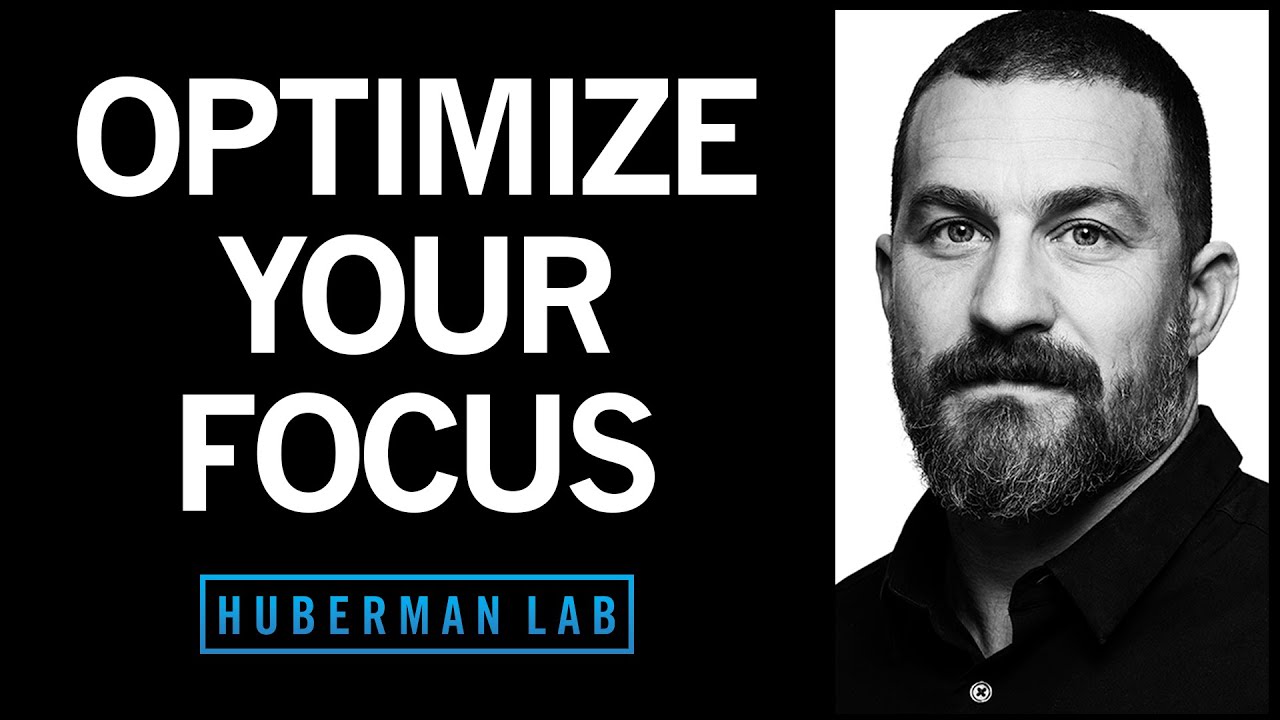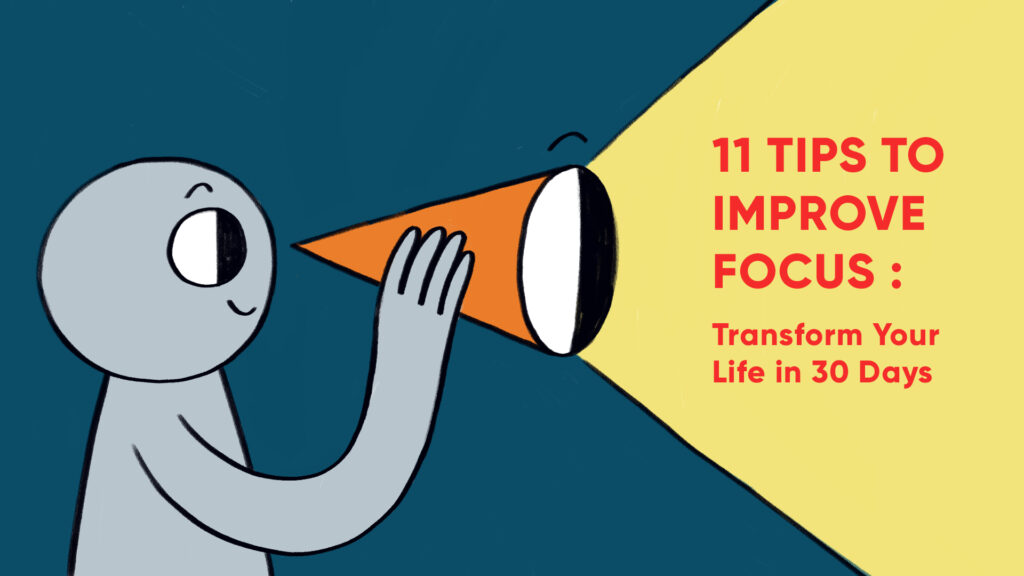
Study after study shows that students who can pay attention longer, without becoming distracted, have higher GPAs.1-3
The daughter of Marie Curie said that her mother was so focused at one point that other students built an arch of chairs around her when she was studying, and she never noticed for hours because of how focused she was. She only noticed when she lifted her head and the whole construction collapsed.
From the science of metacognition to the art of finding your biologically perfect study time, in this post, we will examine 11 advanced tips to revolutionize your focus.
1. Pay attention to Metacognition
Metacognition is being aware of your thoughts. This is often used in meditation, but let’s pay attention to the focus benefit.
One paper compared students who reported a motivation for learning and those who did not have a motivation for learning. The motivated students, not surprisingly, performed better.4
Interestingly, these students paid attention to what they were thinking. However, we are not taught this; as younger students, we perform the tasks because we are told to do them and never pay attention to our thoughts while performing the task. Metacognition, or paying attention to our thoughts, can revolutionize our ability to focus.
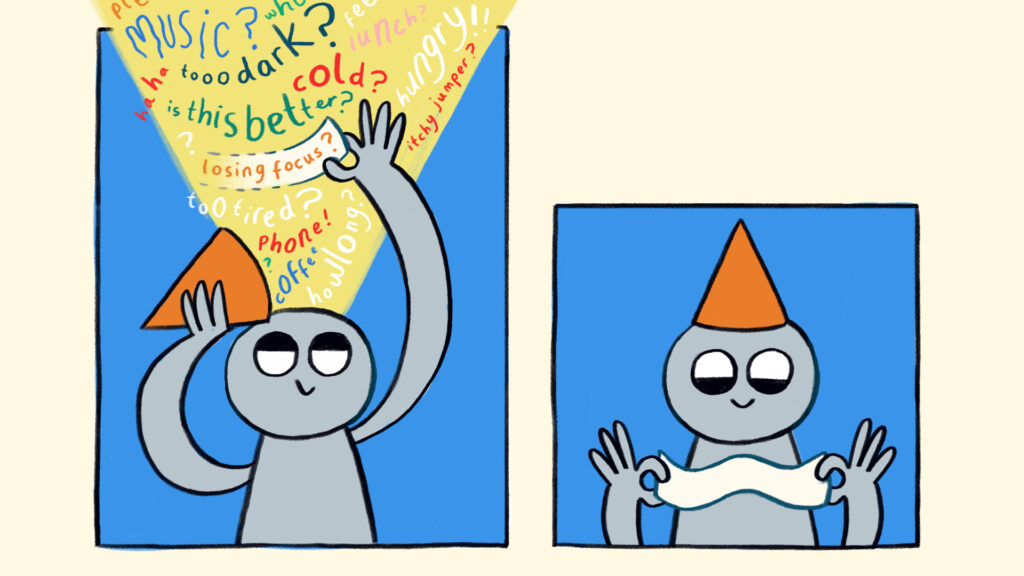
There is a free, evidence-based gold mine I found that comes from psychology researchers here if you want to dive in: https://lse.ascb.org/evidence-based-teaching-guides/student-metacognition/ (this is honestly a gold mine), but in general, it explains how metacognition allows students to be more expert-like in their thinking, more effective, and more efficient.5 Here are a few of the best tips I saw:
- Use Metacognitive regulation: Plan how you will obtain your learning goals → monitor your progress while studying or taking a test (am I spending too long on this question or problem? Am I losing focus quickly by doing this?) → evaluate your preparation for an exam and your performance and studying focus, was one strategy better than the other? Should I change strategies? Was I able to focus better and learn more with this strategy vs another?
- When you face a tough challenge or task, evaluate what made it challenging. How did you achieve focus eventually? How can you implement this in the future?
- Pay attention to when you get distracted and when you lose focus, as well as when you achieve peak focus. Did you receive a phone call? Were you listening to classical music? Was it light outside? Dark outside? What content were you studying?
- If you were teaching yourself, what would the teacher say to you, the student? Are you working too hard? Focusing on the wrong materials? Studying in the wrong way?
Again, if you have the time, I strongly recommend you click through the chart here: https://lse.ascb.org/evidence-based-teaching-guides/student-metacognition/
2. Optimize Air Quality and Lighting
Optimizing air and light quality improves focus.
In one study, students’ concentration was tested in three environments; one was controlled with normal mechanical ventilation, and windows opened as usual, a ‘worse’ condition where mechanical ventilation was down-regulated and window opening was not allowed with a CO2 level of 2000-2500 PPM, and a ‘better’ condition when mechanical ventilation was up-regulated and CO2 was targeted <1000 PPM. There were significant differences between the ‘worse’ condition and the ‘better’ condition, with students in the worse condition making up to twice as many errors as the students in the ‘better’ condition.8
How can we implement these findings? If we live in a particularly polluted city, we should close the windows and have some air filters and live plants. If we don’t live in a city and the air quality is high outside, we should open windows and ventilation if possible, aiming for a CO2 level <1000 PPM (you can find monitors on Amazon!).
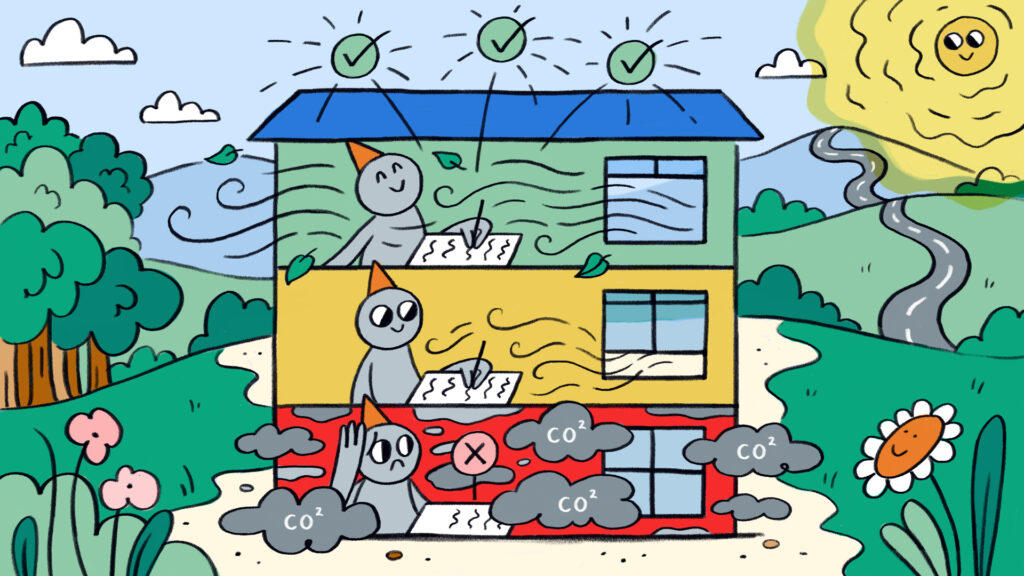
Finally, when worker’s environments are improperly lit, their work productivity suffers. Daylight is the highest quality of light (being near a window that has the sun shining through). If artificial lighting must be used, a color temperature of 4000 K has been shown to produce the highest levels and duration of focus and productivity and light levels at a LUX level of 500-1000, with detailed/precision work at 1500 – 2000; aiming for a LUX of 1000 is a good bet. Have your workstation near a window; if not possible, make sure there are sufficiently bright overhead lights, preferably set to a color temperature of 4000 K (warm white) and LUX of >1000.6,7
3. Embrace Flow Theory
Why does achieving focus have to be this drawn-out, complicated process? When, in some scenarios, it can be magic. The specific magical focus I am referring to is the flow state. In a flow state, we are at the perfect balance of a difficult challenge and expertise. Time loses meaning; we forget to eat, check our phones, or look outside because we are absorbed in our work.
One amazing 10-year study showed that people in a flow state are 500% more productive.12
Furthermore, this isn’t voodoo. Electroencephalography (EEG) shows different brain wave activity when someone is in flow, including increased left alpha frontal activation and overall increased frontal left activation. While negative emotions show increased right frontal lobe activity. 13-15
So, flow is real; how do we achieve it?
- Make sure the topic you are working on is sufficiently difficult and you have sufficient expertise
- Develop some reasoning or importance for doing the task at hand
- Focus on the journey, the moment or working and studying or performing, not the destination
- Pay attention to metacognition to help you enter the flow state quickly; how did you get into the flow state before? How long were you able to stay in it? What pulled you out of it? What dropped you back in?
4. Remove Distractions
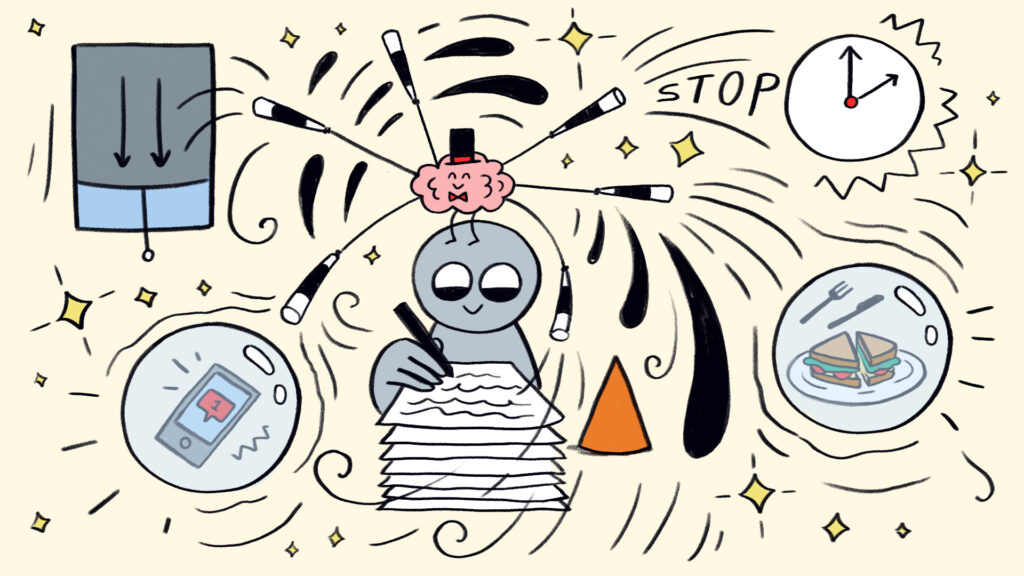
Our physical environment shapes our mental state, cognitive abilities, and ability to focus. In one study, participants were asked to listen to an audiobook and were tested on their retention and ability to maintain focus on the audiobook between two different settings. One group was in a controlled lab environment, and the other was allowed to wander outside the lab. Distraction rates when participants lost focus were 33% higher in the high-distraction setting, outside the lab, and their test performance was 20% worse.11
These are significant results! Being in a focused environment could increase your performance on an exam by a whole letter grade and increase the time you stay focused by nearly a third. If you usually study 10 hours a day but five hours of that is unfocused, removing distractions could give you an additional 3 hours (that’s huge) of focus time.
5. Intermittent Breaks
People who take breaks have better cognitive performance and better focus.16, 17
Let’s make the cliche comparison to running, “this is a marathon, not a sprint.” Marathoners often take breaks not only when training but also when running the actual marathon.
Overall, the data support the role of micro-breaks for well-being, while for performance, recovering from highly depleting tasks may need more than a 10-minute breaks.Albulesco et al.
Source 16
They also concluded that micro-breaks positively impacted well-being by enhancing vigor and lowering fatigue, regardless of contextual factors.
My favorite method of taking breaks is the Pomodoro method. I study for 25 minutes at a time and then take a 5-minute break. This is repeated four times, and on the fourth time, I take a 30-minute break. Another timing increment I like is 50/10—50 minutes of work followed by a 10-minute break. There are two cycles; the second break cycle lasts 30 minutes instead of 10.
I have a whole post on breaks, but the best things are going outside, having a mini-exercise session, changing position, grabbing a healthy snack, meditating, cleaning, napping, or chatting with a friend.
6. Chunk or Stratify your Tasks
In a seminal paper, George Miller proposed the theory that humans can only hold 7 +/- 2 objects in their short-term memory bank, also known as Miller’s law. Applying Miller’s Law, we must break the information we need to study or learn into reasonable chunks, or else we have no hope of retaining or learning them.
Chunking or Stratifying your tasks makes them manageable in your mind and real life. Studying for “The Test on Biology” sounds daunting. But what if we had to do practice questions 1-10 of chapter 1 for the first hour of the day? Then, take a 10-minute break and practice questions 11-20 for another hour. Then a walk. Then, 200 flashcards. Doesn’t that sound much more reasonable?
Partitioning out our work like this will help us abide by the studying because it will naturally integrate breaks, which will help us maintain focus in the long run.
7. Understand the “Why”
Shift your mindset from “I have to work” to “I get to work.”
Usually, you do things because you have to do them. However, “because you have to do them” is unlikely to inspire laser focus. Whatever you are working on, you need to be that annoying kid to yourself; ask, “Why?” Then ask “why?” again, and again, and again. Repeat it until you come up with an answer that makes sense. And if you can’t come up with an answer that makes sense to you, it might be time to seriously think about “why” you are working on this project (this thought project has saved me multiple times in my life). Hopefully, however, you come up with a good reason. Then, you can set concrete goals; the more specific the plan, the more likely you will accomplish it (this is backed by research).
One bonus tip: if you want to trick yourself into having a why, can you treat your work as a project? Professors in chemistry, for example, have learned that making their chemistry courses revolve around big projects instead of written lectures dramatically improves student engagement and performance. Maybe you aren’t just learning biology; you are figuring out what the optimal cell would look like in your design; to do that, you need to understand the way ribosomes work, mitochondria, and cell membranes; who knows, maybe you will go crazy, and your cell will have a cell wall and a cell membrane AND 3 flagella!!18
8. Make it a Habit, Forget about motivation
Motivation is a myth. Consistent focus is the secret to accomplishing more. This is, sneakily, the most crucial tip of this entire video. If focusing can become the status quo, you will blow past your peers.
Your focus will eventually become conditioned into yourself. This is the magic point, where you don’t need all the fancy tricks; you can sit down and work. This is what I strive for.
Here are some quick tips to maximize your habit building abilities:
- Have one seat, one location, where you always focus. When you sit there, it is work time. If you stop working, that’s ok, just DON’T do it at that location, get up, and go goof off somewhere else. When you sit there, it’s work time (classical conditioning).
- Try to have consistent times during the day when you study and focus. This is usually from 6-9 in the morning and then 6-8 at night if I have things to do during the day. Otherwise, I add 1-5 (10-12; I usually exercise, eat lunch, and relax).
- Predictors of academic achievement are your habits; students with good study ethics at home perform better on standardized tests. 19
- Use habit stacking, popularized by Atomic Habits, to make your focus a habit. Maybe you always start focusing after your morning shower, or after a morning workout, or after breakfast. All you are doing is making this habit immediately start after a habit you have already established (like showering, or working out, or having breakfast).
- If you stick with this for 3 months the habit will be solidified and stick, but be vigilant with the above or it could fade away.
Plan every month, every week, every hour. Do what you plan. Motivation doesn’t matter to you anymore because you are strong. Because you are a professional. It is in your nature to do what must be done. And what must be done is scheduled, planned, you know what must be done. So please do it.
9. Find your perfect study time
Do you do better work in the morning or at night? After breakfast or before? After a workout? After a shower?
Which time do you do which quality work? Are you more creative in the evening and more analytical in the morning (most people are)?
This comes back to metacognition, when you do your best work, pay attention, and repeat.
Here’s a nice video from Andrew Huberman on finding that perfect focus and concentration time:
10. Check-in on your health
Even though this is tip #10, it should be the first thing you do to improve long-term focus. Now, even though I am a doctor, I’m not your doctor. I suggest you ask your doctor if any of your medications or conditions affect your ability to maintain focus and if you can do anything to improve your focus or time your medicines so they don’t interrupt your focus.
For example, a patient with ADHD might do better work an hour after their medication. Also, a patient with insomnia probably shouldn’t take their sleeping medication and then try to focus. Also, of course, the specific pharmaceutical and dose of the drug may need to be adjusted.
Here are some quick tips from Harvard of things that can reduce focus:21
- Uncontrolled depression, sleep disorders, vision, or hearing issues.
- Medication side effects
- Excessive Drinking: alcohol impairs not only thinking but also sleep, which ultimately affects concentration
- Information overload: if the TV is on, you are monitoring your emails and text messages, and your neighbor is performing a play titled, “The Pots and the Pans,” do you really think your focus will be optimal?
Here’s what Harvard says about improving focus:
- Try mindfulness meditation, cognitive training, and a healthier lifestyle
Here are the highest impact changes I’ve personally made on my health that have resulted in improved studying in order of awesomeness: duration and quality of sleep >>>>>>>> exercise >>> avoiding alcohol > mindfulness meditation.
11. Increase Physical Activity
Physical activity increases the duration and intensity of focus.
Molecules such as IGF-1 are released during exercise that may be responsible for maintaining brain cells and are directly related to spatial learning and memory.14,15 Another molecule, brain-derived neurotrophic factor (BDNF), a significant modulator of brain plasticity, is also released more during exercise than non-exercise.16Evidence shows that activity (or exercise) in humans and mice increased hippocampal neurogenesis (the part of our brain responsible for memory), cell proliferation, and dendritic branching.17-19 More neural connections and more focus come from exercise.
Exercise is proven to reduce stress and anxiety, and studies show stress and anxiety hinder focus.20
Here’s where it gets interesting: 115 students were given either normal exercises such as running or pushups, or they were given coordination exercises such as jumping robe, juggling, or basketball dribbling, and then given a cognitive test on focus and concentration. The students who practiced coordination exercises performed significantly better than the control exercise students, and the study controlled for heart rate. So, if you want to level up your focus, try adding some coordination exercises to your regular exercises, including jumping rope, ladder drills, or balance exercises.20
Exercise is a focusing superpower. It would be the second lever I pull (after a proper night’s sleep) to help improve focus.
So exercise! The American Heart Association (AHA) recommends 150 minutes of exercise per week.
Thanks for reading. Which tip was the most impactful to you?
Work Cited
- Walck-Shannon EM, Rowell SF, Frey RF. To What Extent Do Study Habits Relate to Performance? CBE Life Sci Educ. 2021 Mar;20(1):ar6. doi: 10.1187/cbe.20-05-0091. PMID: 33444109; PMCID: PMC8108503.
- Sarath A. Nonis [email protected] & Gail I. Hudson (2010) Performance of College Students: Impact of Study Time and Study Habits, Journal of Education for Business, 85:4, 229-238, DOI: 10.1080/08832320903449550
- Ahmady S, Khajeali N, Kalantarion M, Sharifi F, Yaseri M. Relation between stress, time management, and academic achievement in preclinical medical education: A systematic review and meta-analysis. J Educ Health Promot. 2021 Jan 28;10:32. doi: 10.4103/jehp.jehp_600_20. PMID: 33688541; PMCID: PMC7933620.
- Lyn Corno – The metacognitive control components of self-regulated learning, Contemporary Educational Psychology.
- Stanton JD, Sebesta AJ, Dunlosky J. Fostering Metacognition to Support Student Learning and Performance. CBE Life Sci Educ. 2021 Jun;20(2):fe3. doi: 10.1187/cbe.20-12-0289. PMID: 33797282; PMCID: PMC8734377.
- Fang Y, Liu C, Zhao C, Zhang H, Wang W, Zou N. A Study of the Effects of Different Indoor Lighting Environments on Computer Work Fatigue. Int J Environ Res Public Health. 2022 Jun 3;19(11):6866. doi: 10.3390/ijerph19116866. PMID: 35682449; PMCID: PMC9180354.
- Katabaro JM, Yan Y. Effects of Lighting Quality on Working Efficiency of Workers in Office Building in Tanzania. J Environ Public Health. 2019 Nov 14;2019:3476490. doi: 10.1155/2019/3476490. PMID: 31814837; PMCID: PMC6877933.
- Pulimeno M, Piscitelli P, Colazzo S, Colao A, Miani A. Indoor air quality at school and students’ performance: Recommendations of the UNESCO Chair on Health Education and Sustainable Development & the Italian Society of Environmental Medicine (SIMA). Health Promot Perspect. 2020 Jul 12;10(3):169-174. doi: 10.34172/hpp.2020.29. PMID: 32802752; PMCID: PMC7420173.
- Shernof DJ, Ruzek EA, Sannella AJ, Schorr RY, Sanchez-Wall L, Bressler DM. Student Engagement as a General Factor of Classroom Experience: Associations with Student Practices and Educational Outcomes in a University Gateway Course. Front Psychol. 2017 Jun 15;8:994. doi: 10.3389/fpsyg.2017.00994. PMID: 28663733; PMCID: PMC5471299.
- Gold J, Ciorciari J. A Review on the Role of the Neuroscience of Flow States in the Modern World. Behav Sci (Basel). 2020 Sep 9;10(9):137. doi: 10.3390/bs10090137. PMID: 32916878; PMCID: PMC7551835.
- Madero EN, Anderson J, Bott NT, Hall A, Newton D, Fuseya N, Harrison JE, Myers JR, Glenn JM. Environmental Distractions during Unsupervised Remote Digital Cognitive Assessment. J Prev Alzheimers Dis. 2021;8(3):263-266. doi: 10.14283/jpad.2021.9. PMID: 34101782; PMCID: PMC7964516.
- Cranston S., Keller S. Increasing the meaning quotient of work. McKinsey Q. 2013;1:48–59.
- Miller A., Tomarken A.J. Task-dependent changes in frontal brain asymmetry: Effects of incentive cues, outcome expectancies, and motor responses. Psychophysiology. 2001;38:500–511. doi: 10.1111/1469-8986.3830500. [PubMed] [CrossRef] [Google Scholar] [Ref list]
- Pizzagalli D.A., Sherwood R.J., Henriques J.B., Davidson R.J. Frontal Brain Asymmetry and Reward Responsiveness: A Source-Localization Study. Psychol. Sci. 2005;16:805–813. doi: 10.1111/j.1467-9280.2005.01618.x.[PubMed] [CrossRef] [Google Scholar] [Ref list]
- Coan J.A., Allen J.J. Frontal EEG asymmetry as a moderator and mediator of emotion. Boil. Psychol. 2004;67:7–50. doi: 10.1016/j.biopsycho.2004.03.002. [PubMed] [CrossRef] [Google Scholar] [Ref list]
- Wanders L, Cuijpers I, Kessels RPC, van de Rest O, Hopman MTE, Thijssen DHJ. Impact of prolonged sitting and physical activity breaks on cognitive performance, perceivable benefits, and cardiometabolic health in overweight/obese adults: The role of meal composition. Clin Nutr. 2021 Apr;40(4):2259-2269. doi: 10.1016/j.clnu.2020.10.006. Epub 2020 Oct 9. PMID: 33873267.
- Albulescu P, Macsinga I, Rusu A, Sulea C, Bodnaru A, Tulbure BT. “Give me a break!” A systematic review and meta-analysis on the efficacy of micro-breaks for increasing well-being and performance. PLoS One. 2022 Aug 31;17(8):e0272460. doi: 10.1371/journal.pone.0272460. PMID: 36044424; PMCID: PMC9432722
- Robinson JK. Project-based learning: improving student engagement and performance in the laboratory. Anal Bioanal Chem. 2013 Jan;405(1):7-13. doi: 10.1007/s00216-012-6473-x. PMID: 23104311.
- https://books.google.com/books?hl=en&lr=&id=LeZXVVuhpAUC&oi=fnd&pg=PA85&dq=how+to+study+student+performance+focus&ots=sXm42Z4zpH&sig=za-I59A7caPFZR4fwwTb31ALQIE#v=onepage&q=how%20to%20study%20student%20performance%20focus&f=false
- Budde H, Voelcker-Rehage C, Pietrabyk-Kendziorra S, Ribeiro P, Tidow G. Acute coordinative exercise improves attentional performance in adolescents. Neurosci Lett. 2008 Aug 22;441(2):219-23. doi: 10.1016/j.neulet.2008.06.024. Epub 2008 Jun 13. PMID: 18602754.
- https://www.health.harvard.edu/mind-and-mood/tips-to-improve-concentration

